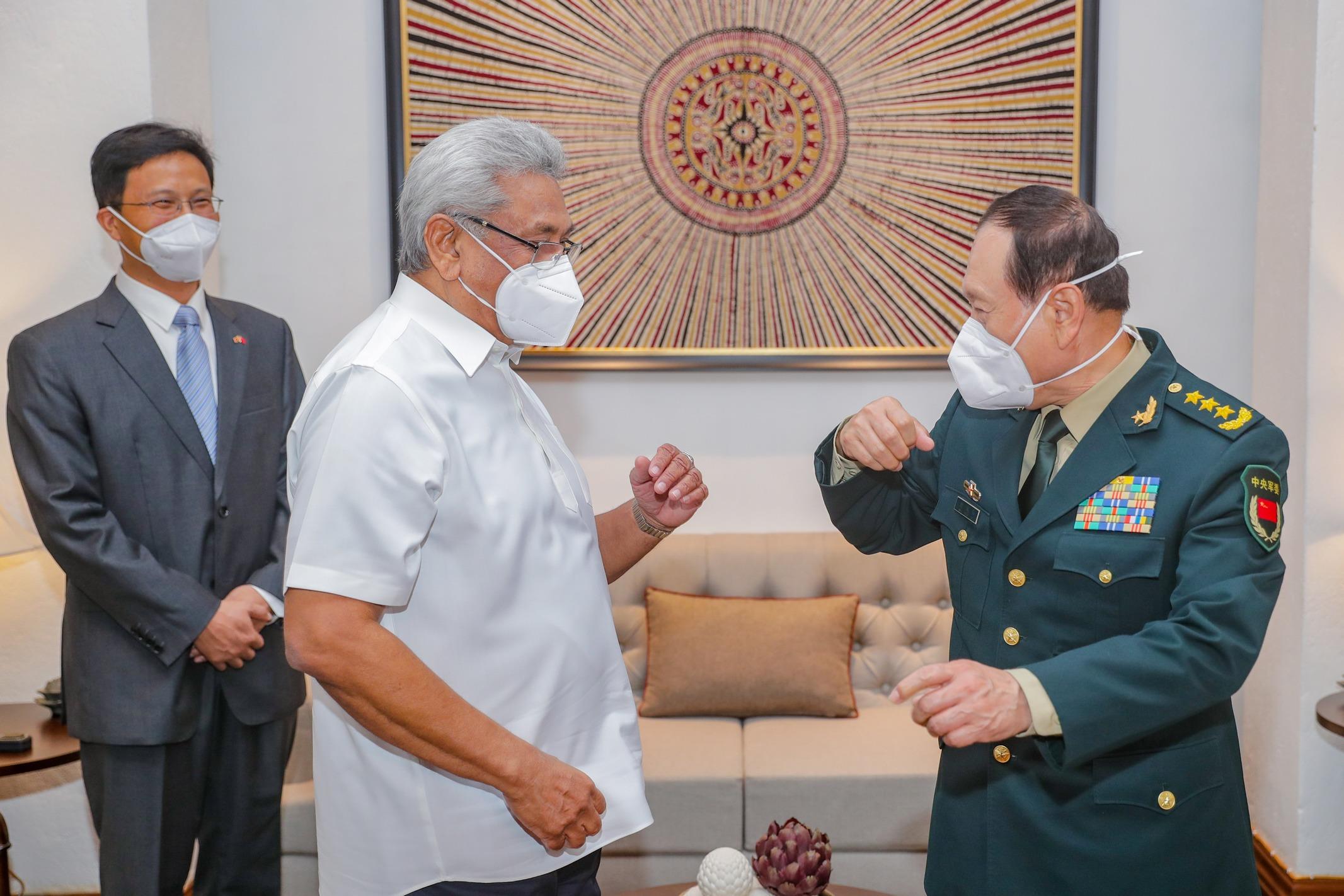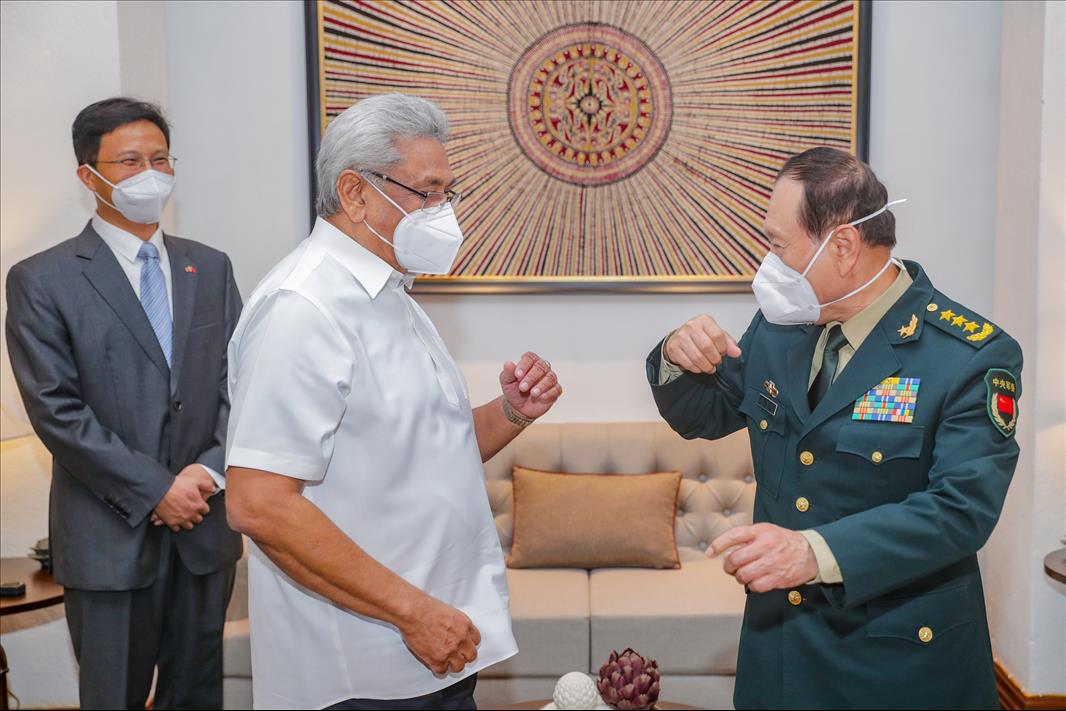
Call in China and why!
(MENAFN- Colombo Gazette)

N Sathiya Moorthy
Who is in charge? This question, the nation's population, has begun asking itself for a few weeks and months. The ruling Rajapaksa brothers lent a strong and focussed leadership to the people, polity and the armed forces at the height of the nation's own ''war on terror'', dividing the responsibilities and resultant accolades between them. War-time President Mahinda Rajapaksa is the Prime Minister now. Then Defence Secretary Gotabaya Rajapaksa is the all-powerful President today. They have a solid parliamentary backing, which only they had earlier, post-war (2010-15) – and not certainly their rivals who replaced them in between, 2015-19.
Yet, there is an indefensible sense of drift that has taken over the government. It was not this bad even when an ex-military man in Gotabaya Rajapaksa took to the all-important political role as the Executive President of the nation. The nation was then limping back to normalcy after the ''Easter Sunday'' blasts, which claimed scores of lives, both Sri Lankan and others – and had lost its self-confidence in the process. More importantly, the nation had lost confidence in the so-called ''Government of National Unity'' (GNU). The replacement rulers had made a mockery of political administration. Today, unfortunately, it is worse, or so it seems.
Today's drift reminds one of the old adage, ''A broken apothecary, a new doctor''. Looks as if President Gota is finding out for himself that it is easy to command an army-troop of demoralised soldiers who had only tasted defeat viz the LTTE, with the right amount of political backing and tactical directions – and leave it to contemporary professionals to run the show. The Rajapaksas'' choice of Sarath Fonseka for army commander through the war-period was testimony to his ability to spot talent. So was his choice of field commanders, at times reportedly not exactly to the liking of Fonseka, now a Field Marshal. Yet, they all worked as a team.
It was this team-spirit that saw the nation through the first wave of Covid-19. Today, when the pandemic is at its worse, and experts are already talking about a ''global third wave'', Sri Lanka is adrift. Sri Lanka does not manufacture the vaccine. Hence, certain confusion is unavoidable in the deployment and disbursement of vaccines. But the same cannot be said of the mismanagement on the lockdown front. Or, making essentials available to a population held back under the lock-down, which keeps getting extended by the week.
On the other foot
It is nobody's case that the lockdown should not be extended, given its potential to bring down the Covid-positive numbers, hence the number of deaths, too. But there seems to be a lack of focus, multiple command and control centres, what with Parliament in session, on and off, and there is also an elected government going beyond the President to respond to, the nation's questions, doubts and suspicions.
Herein comes the role of Prime Minister Mahinda, who as the President stood tall and gave the kind of political leadership that a national crisis demanded, at the height of the conclusive ''Eelam War IV''. Today, it is another national crisis, and one can debate which of the two is the worst. But no one seems to be in charge, and everyone seems to be in charge. If some veteran is reminded of the pre-Rajapaksa leadership of the war, and draws parallels and conclusions, he should not be blamed for it. Instead, it is on the other foot.
Agreed that even after a year and move of the pandemic, it remains an international enigma as none other in living time and memory. There may even be reasons to believe that the numerous vaccines in circulation may only be a hope, as their potency to safe people from the pandemic can be proved only when nations and societies moved along. But that should not make one doubt the need for the vaccine or suspect the usefulness of it in bringing down the numbers, and dramatically so.
Multiple areas
The problem is this. The political leadership is clueless in everything other than military, it is coming to be proved time and again in their short term in office. Fortunately for them, the so-called experienced leadership of their GNU rivals in matters political administration, did not help either. They had most of the post-war peace-time to guide and run the government, and they made an equal mess of it, as they claimed the Rajapaksas had done for a decade before their turn.
Today, the economy is in a worse condition than when the Rajapaksas inherited. They have stopped calling their predecessors as the cause, just as the latter had called the earlier Rajapaksas stint. The Rajapaksas cannot, and they have a cause to be blamed for. The premature decision of the Gota presidency to curb imports of essentials like the daily-use turmeric and fertilizers before the nation had actually produced them in abundance, has led to an avoidable crisis – that is now on their hands, laps and all over.
This is only an example. The sum total is that President Gota seems wanting to learn it all at work, and not come to the job with a certain level of experience and understanding that is required of a political administrator. It is truer of someone wanting to and having to win future elections for his party.
In the absence of a sense of direction, and insensitive ways of enforcing whatever direction chosen, may be to blame if the Rajapaksas were to suffer defeat, say, in the Provincial Council elections, if and when held under their care. The GNU stalled the process then, the Rajapaksas too have now chosen ''electoral reforms'' as the excuse to delay it.
Who is the worse…
If this is the condition in the ruling SLPP-led combine, it is worse in the Opposition camp. Barring the miniscule minority that the left-leaning JVP is, the mainline SJB Opposition thinks one way, acts another way and keeps scoring self-goals all en route.
The Opposition ranks and voters desperately wanted a new leader in the place of the over-exposed and ever-scheming UNP leader Ranil Wickremesinghe. They did not evaluate the suitability of Sajith Premadasa for the job, especially of the UNP, the party that has for long come to be seen as the party of the elitist urban middleclass, for them and by them.
Sajith did not fit in, given his own rural background, which was a boon to the UNP's political rivals in the Rajapaksas in the SLFP first and their own SLPP more recently. The SJB Opposition drift is all palpable as in the case of the Gota presidency. If no one is talking much about it since, that is because no one in the SJB is talking either – or, at least talking sense.
Minority matters
Then there are the multiple minority societies and their divided polities. The Sri Lankan Tamil polity is as divided as the community. The reverse is truer, again. The problem has all along been that of the community cherishing and relishing a multiplicity of leaders than their total numbers could afford and justify.
Hence, also among the reasons for LTTE's Prabhakaran model of 'sole representative'' and one leader, even at the cost of many other lives, also from the same constituency. Today, a decade after the exit of the LTTE and Prabhakaran, the community and polity are to their old days and ways. The political leaders use their God-given intellect to draw fine distinctions that may not exist – and is certainly worth so many lives through multiple generations, already.
The Upcountry Tamils are always in a disarray. In this year after Arumugan Thondaman, no one has taken the effort to unite them under a common umbrella. Yet, thankfully, it has not split even more than the community could afford, post-Thonda. Maybe, there is something for the others to learn, however limited it be.
The Muslims are the worst-hit, and they have learnt the minimum from the post-blast ethnic hatred, which has made them possibly replace the SLT community as the majority Sinhala-Buddhist community's prime hate-object. The hate-mongering began post-war under Mahinda Rajapaksa's second term as President.
The successor GNU did little to assuage the hurt sentiments of the frustrated Muslim youth. Today, it is worse. Though united against their Sinhala-Buddhist detractors, the community is yet to come together under a single socio-political platform. There again, leadership egos cannot stand unity and commonality.
The youngest one in the block is the Sinhala-Catholic community. The Tamil Christian community, their priests and bishops have always been with the mainline Jaffna Vellalars on the ethnic issue, whether the leadership was moderate or militant of the LTTE kind. It was not the case with the Sinhala-Catholics.
Today, post-blasts, the Archbishop of Colombo, Malcolm Cardinal Ranjith, seems determined to make the community an electoral constituency, whose future may still remain unpredictable for now – and possibly divided into multiple factions in the none-too-distant future. His politicisation of the ''Easter blasts'' probe seems more than required under the circumstances. If the Sinhala-Buddhist majority turn against the community next, the seeds are being sown now. Wonder of wonders, unlike in other communities – and thankfully so – there is no voice that opposes, if not criticise, His Eminence.
Negative list
At the end of it all, if there is a clear focus and sense of direction to the nation, it is of, by and for the Chinese. Or, is it ''off, buy and far'' the Chinese, as if things China in the country remain unaffected by the turn of political events, economic situation and Covid conditions. The fast-tracked passage of the Colombo Port City Bill, that too after obtaining the Supreme Court's mandatory ''determination'', is only the latest example.
Earlier, it was in the negative list – simultaneous cancellation of the MoU involving tri-nation ECT project, involving India and Japan, and then the ''MCC funding offer'' from the US. What did not possibly suit or comfort the Chinese ally of Sri Lanka had to go. And they went.
The UNP rulers of the day did not have the agreements signed in their time, possibly citing political instability, but they have acquiesced to the Port City project, both in power and now out of it, so what if the party has taken a new name as the SJB. Earlier, their complicity was evident in the Hambantota ''debt-equity swap-deal'', where the Rajapaksas took the blame for inviting China in. Did the latter care for criticism, both internally and internationally? No.
Does it all mean hand over the nation to China, for it to rule, which their Embassy in Colombo is already doing through news releases from time to time? If nothing else, the Chinese, and Chinese alone have shown how how to run the Government in and for Sri Lanka and Sri Lankans, without their own objectives drifting away from their goal, and all in good time. Anyway, is it not happening already, though through a Hambantota bit there, a Port City here, and the CICT (Colombo International Container Terminal), in between!
(The writer is Distinguished Fellow and Head-Chennai Initiative, Observer Research Foundation, the multi-disciplinary Indian public-policy think-tank, headquartered in New Delhi. email: [email protected] )
MENAFN07062021000190011042ID1102223441

Legal Disclaimer:
MENAFN provides the
information “as is” without warranty of any kind. We do not accept
any responsibility or liability for the accuracy, content, images,
videos, licenses, completeness, legality, or reliability of the information
contained in this article. If you have any complaints or copyright
issues related to this article, kindly contact the provider above.


















Comments
No comment